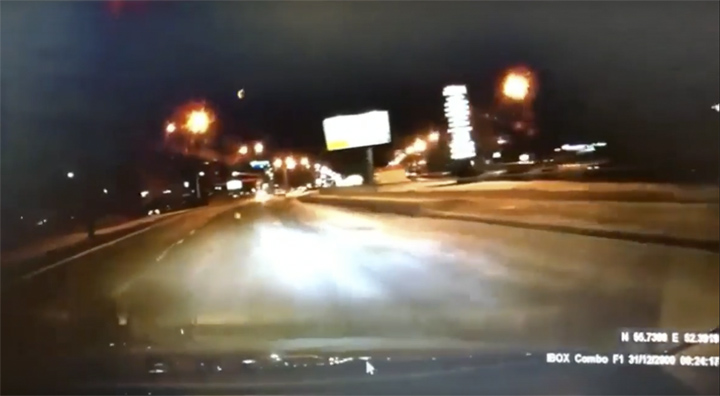Mystery explosion turned 'night into day' over Russia
The phenomenon unfolded across the Bashkortostan, Udmurtia and Tatarstan regions.

Experts are divided over what caused the mysterious bright flash that appeared over a large part of Russia earlier this week.
The ground reportedly shook as the explosion of light unfolded and, for a brief moment, turned the black night sky into a bright, vivid blue.
The combination of bright light and reports of ground shaking prompted speculations a missile test had been carried out. However, Moscow quickly moved to dismiss the rumour, suggesting there had not been a missile test nor had any space rock crashed to earth, as some had suggested.
The light was seen over thousands of miles in Russia, but was especially prominent across the Bashkortostan, Udmurtia and Tatarstan regions in the west of the country, close to the Ural mountain range.
Similar phenomenons were reported in Moscow in 2006 and in Kazan last year.
'We saw this while driving," eyewitness Artyom Russkikh was quoted as saying by the Siberian Times.
"There was a vibration and the sound of explosion in the sky. Awesome."
Another witness said the light, which appeared on Monday night (7 January), "lit the night sky from side to side, making it look brighter than daylight".
Other eyewitnesses hinted the phenomenon could be traced to a meteor exploding in the atmosphere, rather than military activity.
"A meteor burned out, not reaching the lower layers of the atmosphere," witness Denis Rozenfeld was quoted as saying.
"Before this it exploded and split into many small pieces. That is why there was such a sound, which came to us in a few seconds.
"It's a funny coincidence that such a rare phenomenon for our region has happened right over Christmas [Orthodox Christmas falls on 7 January]."


The theory appeared to be confirmed by Sergey Golovkin, of the Kazan Federal University in Tatarstan.
"This was a bolide, when all substance burns in atmosphere and doesn't reach Earth," he was quoted as saying.
"It is accompanied by a loud bang. It could have been a fragment of a spacecraft that burnt, but normally it takes them more time to enter the atmosphere, thus they can be observed for longer.
"This was a bolide that burnt in the dense layers of the atmosphere, which is why it was seen over such a big territory.
"We didn't register the flash because there was strong blizzard on this night.'
Golovkin's stance, however, was not unanimously shared.
"There are a huge number of effects linked to atmospheric electricity, many of which are not properly studied because of how rarely they occur," added Yuri Nefefyev, director of the Engelhardt Astronomical Observatory.






















